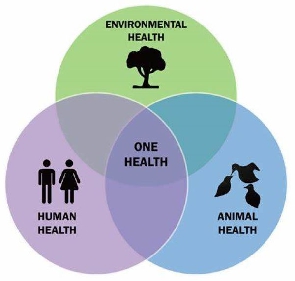 File photo: Ghana begins policy dialogue on institutionalizing one-health approach
File photo: Ghana begins policy dialogue on institutionalizing one-health approach
As part of the steps being taken to enhance Ghana’s health delivery and outcomes, the World Health Organisation (WHO) and stakeholders have begun a policy dialogue on the implementation of the One Health approach.
The event, under the theme: ‘Policy Dialogue on One Health Implementation in Ghana’ was organised by the One Health Technical Working Group with support from WHO, FAO, NADMO and other One Health partners on June 23, 2023, to bring together stakeholders from various sectors to foster multi-sectoral engagement and effective coordination.
Addressing the audience, Dr Sofonias Asrat, Officer-In-Charge at WHO Ghana emphasized the need for sustained and coordinated collaborations across sectors to address health challenges comprehensively, with a focus on food safety, zoonotic diseases, and antimicrobial resistance.
“Ghana has been an example of a country where, on a number of fronts, multiple sectors attempt to collaborate on health issues. Effective coordination of these collaborations have been limited or unsustained in other cases.
“One Health, which refers to an approach of multi-sectoral engagement with the ultimate aim of achieving better health outcomes, becomes a strategy for institutionalising effective coordination for sustained results in our public health efforts. The areas of work in which a One Health approach is particularly relevant include food safety, the control of zoonosis and combating antimicrobial resistance,” Dr. Sofonias Asrat said.
Globally on the emerging, and re-emerging front, the WHO underscored that diseases have posed significant threats to Ghana’s public health.
Recent outbreaks of novel coronaviruses, Ebola viruses, and zoonotic and pandemic influenza viruses have underscored the importance of a holistic approach to health.
Ghana itself has faced outbreaks of diseases such as Yellow Fever, Monkeypox, Marburg Virus Disease, Lassa Fever, and Anthrax in recent months and years.
“In Ghana, WHO has supported several One Health initiatives, including the One Health Technical Working Group, awareness creation through initiatives for rabies elimination and the annual International One Health Day, the National Bridging Workshop on Rabies and the IHR-PVS National Bridging Workshop which developed a roadmap for strengthening coordination among One Health partners and most importantly the development of the draft One Health policy with the objective of institutionalizing One Health implementation in Ghana.
“The WHO has also partnered with government on the implementation of several initiatives in antimicrobial resistance. Additionally, WHO is supporting capacity building initiatives for health staff to manage health risks related to the environment and climate, as well as air pollution,” Dr. Asrat continued.
According to Dr. Sofonias Asrat, the concerns in the health sector if left unaddressed, projections suggest a staggering increase to 10 million deaths annually by 2050.
These alarming figures emphasize the pressing need to prioritize the interface between humans, animals, and the environment for effective health management.
“The experts have invested time and resources in drafting a policy to provide the framework for institutionalising this coordinated approach of working in the interest of human, environment, and animal health. Now more than ever is the time to throw in our support for the institutionalisation of the One Health approach in Ghana.
The WHO remains committed to supporting the government and people of Ghana to improve health security through the deployment various tools and mechanisms including the One Health approach,” Dr. Sofonias Asrat concluded.
You can also catch up on the third episode of Everyday People below:
Share your news stories and ideas with GhanaWeb

To advertise with GhanaWeb

NW/MA